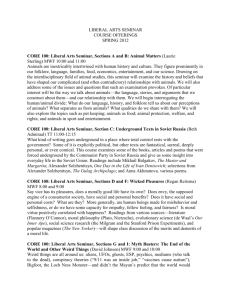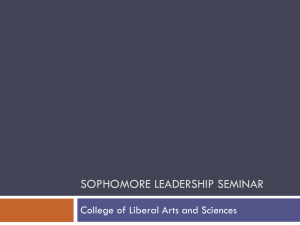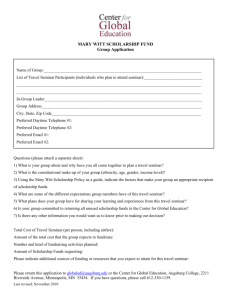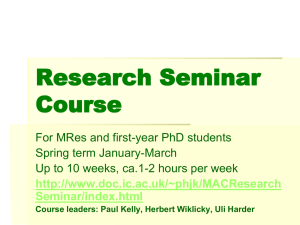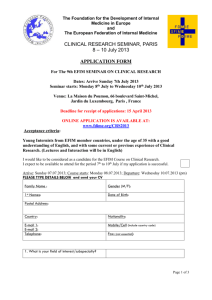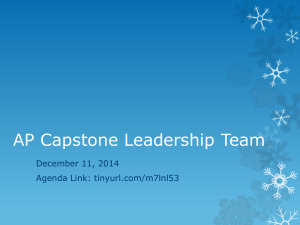Sections for Fall 2011
advertisement
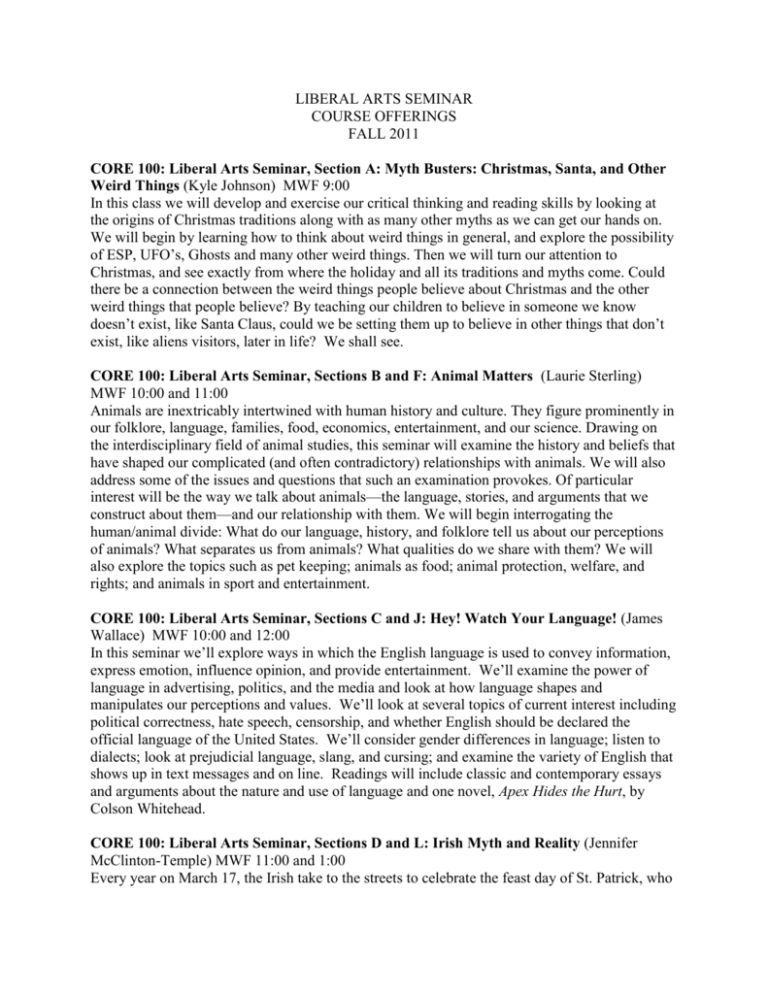
LIBERAL ARTS SEMINAR COURSE OFFERINGS FALL 2011 CORE 100: Liberal Arts Seminar, Section A: Myth Busters: Christmas, Santa, and Other Weird Things (Kyle Johnson) MWF 9:00 In this class we will develop and exercise our critical thinking and reading skills by looking at the origins of Christmas traditions along with as many other myths as we can get our hands on. We will begin by learning how to think about weird things in general, and explore the possibility of ESP, UFO’s, Ghosts and many other weird things. Then we will turn our attention to Christmas, and see exactly from where the holiday and all its traditions and myths come. Could there be a connection between the weird things people believe about Christmas and the other weird things that people believe? By teaching our children to believe in someone we know doesn’t exist, like Santa Claus, could we be setting them up to believe in other things that don’t exist, like aliens visitors, later in life? We shall see. CORE 100: Liberal Arts Seminar, Sections B and F: Animal Matters (Laurie Sterling) MWF 10:00 and 11:00 Animals are inextricably intertwined with human history and culture. They figure prominently in our folklore, language, families, food, economics, entertainment, and our science. Drawing on the interdisciplinary field of animal studies, this seminar will examine the history and beliefs that have shaped our complicated (and often contradictory) relationships with animals. We will also address some of the issues and questions that such an examination provokes. Of particular interest will be the way we talk about animals—the language, stories, and arguments that we construct about them—and our relationship with them. We will begin interrogating the human/animal divide: What do our language, history, and folklore tell us about our perceptions of animals? What separates us from animals? What qualities do we share with them? We will also explore the topics such as pet keeping; animals as food; animal protection, welfare, and rights; and animals in sport and entertainment. CORE 100: Liberal Arts Seminar, Sections C and J: Hey! Watch Your Language! (James Wallace) MWF 10:00 and 12:00 In this seminar we’ll explore ways in which the English language is used to convey information, express emotion, influence opinion, and provide entertainment. We’ll examine the power of language in advertising, politics, and the media and look at how language shapes and manipulates our perceptions and values. We’ll look at several topics of current interest including political correctness, hate speech, censorship, and whether English should be declared the official language of the United States. We’ll consider gender differences in language; listen to dialects; look at prejudicial language, slang, and cursing; and examine the variety of English that shows up in text messages and on line. Readings will include classic and contemporary essays and arguments about the nature and use of language and one novel, Apex Hides the Hurt, by Colson Whitehead. CORE 100: Liberal Arts Seminar, Sections D and L: Irish Myth and Reality (Jennifer McClinton-Temple) MWF 11:00 and 1:00 Every year on March 17, the Irish take to the streets to celebrate the feast day of St. Patrick, who converted the pagan Irish to Christianity and drove out the snakes as an added bonus. But more than celebrating those accomplishments, we are also celebrating ourselves, and what it means to be Irish. Ireland's history is filled with oppression and independence, poetry and violence, selfrighteous aristocrats and fun-loving drunks, mythical warriors and very real terrorists. We will look at how the image of Ireland and Irishness matches up to the reality, how a national identity was created to advance Ireland's fight for independence, how that national identity continues to contribute to the contemporary violence in Northern Ireland, and what all of this means for anyone who claims Irish heritage, including Irish-Americans. CORE 100: Liberal Arts Seminar, Sections G and K: Peace and Social Justice: What are the Alternatives to Violence? (Dr. Noreen O’Connor) MWF 12:00 and 1:00 The peace sign is so popular today as a fashion symbol, we can find it on everything from expensive designer jewelry to complete dorm bedroom sets. But if everyone-- large nations to simple individuals-- claims to want peace, why is there so little of it? Why is violence routinely used as the way to settle conflicts, whether across an ocean or across the living room? And one more question: what do we really know about the alternatives to violence? Students in this course will consider a variety of voices and ideas about nonviolent means of solving human problems. Students examine the theory and practice of nonviolent social change and explore the ideas of Henry David Thoreau, Virginia Woolf, Mohandas K. Gandhi, and Martin Luther King, Jr., Dorothy Day, Charles Chaplin, and more. We will read essays, poems, stories and reports, consider and analyze plays, films, and art to study nonviolence. This course is those who are intellectually brave, spiritually alive, socially engaged, and lovers of long-shots. CORE 100: Liberal Arts Seminar, Section I: Radicals and Revolutionaries (Margarita Rose) MWF 9:00 What do Karl Marx, Jesus Christ, and Betty Friedan have in common? You could add to the list Albert Einstein, Rachel Carson, Nelson Mandela, and Mahatma Gandhi. Each of these individuals challenged the power structure of their time by offering a radical way of viewing the realities around them. Their thinking sparked revolutions in how humans interacted with one another and in some cases how humans interacted with the natural environment. By taking a critical look at the writings by, or about, these radical thinkers, we may begin to challenge our own worldview and the power structures and cultural influences that have shaped us. Additionally, we will consider what it means to be a revolutionary and how thinking “outside the box” can impact our place in society. Are there issues on which we take a radical position? Are we willing to be marginalized for our beliefs and/or our actions to bring about positive social change? CORE 100: Liberal Arts Seminar, Section M: Mapping the Ghetto: The Venetian Ghetto in History and Memory (Daniel Clasby) TT 9:30 In this course we will "map" the use of the word ghetto in a world history context. This course is multidisciplinary in design and incorporates a wide variety of scholarship, including academic surveys, Shakespeare's the Merchant of Venice, Renaissance poetry written by Venetian Jewish women, and postcolonial fiction. From the academic vantage point of urban culture and architecture, art history, Italian and Jewish literature and history we will study the ways in which Venice and its Jewish community, which had its organizational beginnings in the Ghetto, is a microcosm of European and world history. We will shift focus in the second half of the course and examine how the idea of the ghetto has been used and abused in more contemporary times. 2 We'll look at the ghettos of Nazi-occupied Europe and compare them to the use of the word to describe areas where poverty persists and opportunity is all but lost for marginalized people, especially in a global context. We'll also examine the expropriation of the word in various contexts and look to see whether ghettoization must always describe a persecuted existence of confinement and powerlessness or if, as in the case of modern hip-hop music, it can be used to empower someone and to criticize the social condition and the politics of a nation, as well as signify community and identity. CORE 100: Liberal Arts Seminar, Sections N and O: Unruly Women through the Ages (Megan Lloyd) TT 9:30 and 11:00 Sarah Palin, Hillary Clinton, Queen Elizabeth, Cleopatra, Joan of Arc, Medea, Lady Macbeth, and maybe your mom. This course investigates the strong female in literature, history and society and explores the attitudes and anxieties about power that smart, assertive women generate. CORE 100: Liberal Arts Seminar, Section P: Greed: Wealth and Ethics in Modern America (Janet Mercincavage) TT 12:30 If “Greed” were an acronym, it might stand for Gains and Rewards on Everyone Else’s Dime. There seems to be no end to the number of people who have recently managed to get very wealthy at someone else’s expense. Over the last decade, anyone attentive to any form of media could not escape the unsettling volume and varied forms of human greed exposed in activities conducted in the normal course of daily business. This course will examine topics and issues such as the role nature and nurture play in influencing human greediness and the rippling effect that the actions of individual perpetrators have had on the wellbeing of relevant stakeholders (such as citizens, family members, taxpayers, shareholders, and business enterprises). We will look not only at the motives and actions of people driven by greed, but also, more important, at the consequences of such illegal and immoral missteps. CORE 100: Liberal Arts Seminar, Section Q: From Woody Guthrie to Woodstock (Marlon Alber) MW 2:00 In this class, we'll respond to music, film, poetry, novels, plays, and critical essays spanning from the Great Depression to the Vietnam War. Our group will share the responsibility of contributing to a free exchange of ideas and continue the dialogue with iconic writers (John Steinbeck, Tennessee Williams, J.D. Salinger, Arthur Miller, Sylvia Plath, Allen Ginsburg, Jack Kerouac, Martin Luther King, Daniel Berrigan, David McCullough, Toni Morrison, and more) and musicians (Odetta, Woody Guthrie, Hank Williams, Bob Dylan, Joan Baez, Johnny Cash, Arlo Guthrie, John Lennon, Simon and Garfunkel and more). We'll listen to lyrics, interpret music as poetry, and place the stories being told into their historical contexts. We'll also read some of the toughest critics of these icons and explore the validity of arguments being presented. Research projects include analytical interpretation and interaction with the critical reviews of the musicians and writers covered in class. All research topic selections will be student-based. Possible texts include Bound for Glory, by Woody Guthrie, and On the Road, The Dharma Bums, or The Subterraneans, by Jack Kerouac. 3
